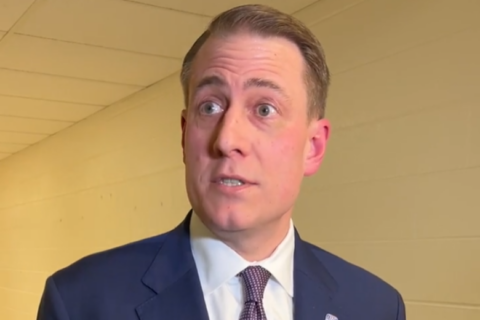A nonprofit that addresses mental health and suicide prevention among teenagers hopes to expand in Montgomery County, Maryland, schools this school year.
Before the pandemic, there was one Our Minds Matter club in Montgomery County schools. Now, there are 17 high school chapters across the system, said senior coordinator Catherine Royston. And during school board meetings in Montgomery County over the past year, a number of students spoke out in favor of establishing chapters in all of the county’s high schools.
Two middle schools also have Our Minds Matter chapters.
The organization was founded as the Josh Anderson Foundation, a nonprofit established in Vienna, Virginia, as part of an effort to end teen suicide. It was named for 17-year-old Josh Anderson who died by suicide in 2009.
“Student leaders generally lead meetings,” Royston said. “It can be once a month; it could be once a week, or anywhere in between.” During the meetings, students “engage with their peers in conversations around mental health.” But Royston told WTOP, “We require that at least one mental health professional is in the room at each meeting or club event.”
The process of establishing a club in a school starts with getting permission from administrators in that school; after that, a school-based sponsor is chosen.
“A club sponsor is a school psychologist, counselor, social worker, or maybe even a teacher who has a background or training in mental health,” Royston said.
In some cases, should a student need more support, the sponsor could act as a liaison to a school counselor, or provide information about services outside of school. “Or they could be a trusted adult to just listen and talk to the teen,” Royston said.
Still, Royston said, “Our Minds Matter is not group therapy.” There are “guiding principles” and “zones,” Royston said, “to make sure that a meeting space stays safe, to make sure a student is not disclosing too much, that we’re not exploring personal symptoms.”
Instead, said Royston, students learn about mental health and get a chance to practice coping skills. The sponsor, she said is there “to make sure that conversation remains appropriate, and that students get resources or extra help if they need it.”
Royston says her role is to provide oversight to the clubs in participating schools. “I essentially coach the different clubs. I can come in for a site visit, or attend a meeting with them.”
The clubs can be tailored to address needs among student groups. Royston said in the past they’ve featured themes including “Men’s Minds Matter” and “Athletes’ Minds Matter.”








